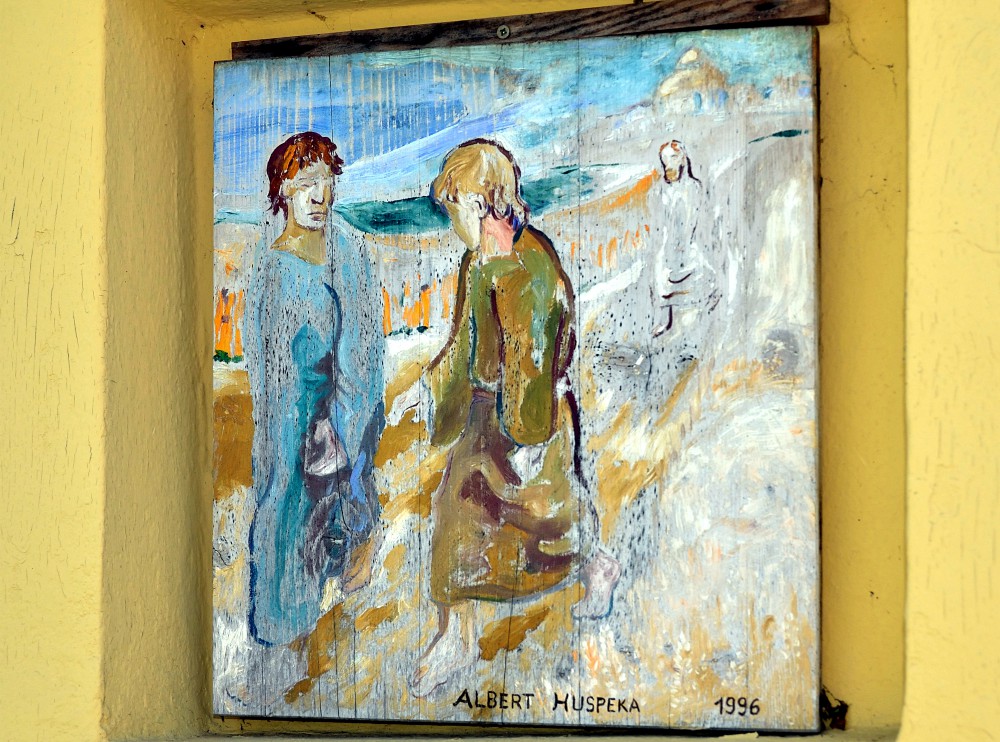
At a wayside shrine in Wipfing, Austria, a painting by Albert Huspeka depicts the journey of the disciples to Emmaus. (Wikimedia Commons/Herzi Pinki)
The story of the journey of the disciples to Emmaus best reflects the times we are in, according to Sr. Jolanda Kafka, general superior of the Claretian Missionary Sisters and president of the International Union of Superiors General, and Fr. Arturo Sosa, Society of Jesus and president of the Union of Superiors General. Kafka and Sosa issued a summary letter June 29 on the joint meeting of their two organizations that took place in late May.
Confusion, chaos, fear and questions about the future haunted the disciples as they felt lost without Jesus. Meeting him, speaking with him of their sorrow, and feeling his caring presence opened them to recognizing that he was still among them.
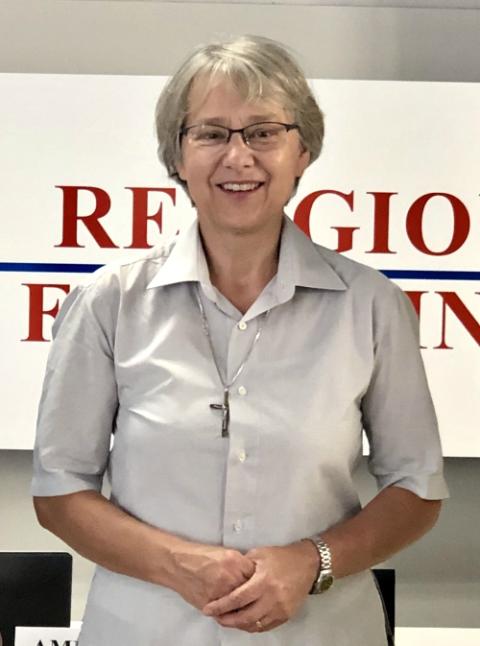
Claretian Missionary Sr. Jolanda Kafka, president of the International Union of Superiors General (CNS/Courtesy of the U.S. Embassy to the Holy See)
"Let's take care of one another just as our saving God cares for us," was the theme of the leaders' letter of encouragement, citing the meeting of May 25.
"With the pandemic, new and old forms of poverty are expanding, while social illnesses are coming to light that make rebirth difficult," the letter said. Kafka and Sosa invited us all to initiate processes of care that will create an entire culture of care: of the Earth, our homes, our youth, elders and all those who have been left behind on the margins, the forgotten.
"It is a time of communion, of an ever greater awareness of the interconnection that exists between us," the letter said.
"Like the disciples, we recover the profound meaning of our consecrated life: to go on mission, to proclaim with our lives and our work the Lord Jesus, who opened for us the ways of justice and reconciliation."
Their reflections outlined many of the issues facing religious women and men I heard voiced in two recent webinars in May: "Reimagining the Future: Religious Life in the U.S." and "Religious Life in Europe," hosted by the International Union of Superiors General. Hearing similarities and differences about how these conferences of Europe and the United States see the future gave me a broader vision of how to think about religious life in the West.
I was struck with the complexities that Europe's conference faces in relating with so many country conferences in a relatively small geographic area. The Union of the European Conferences of Major Superiors gathers 39 national conferences representing the major superiors of apostolic religious institutes in European countries.
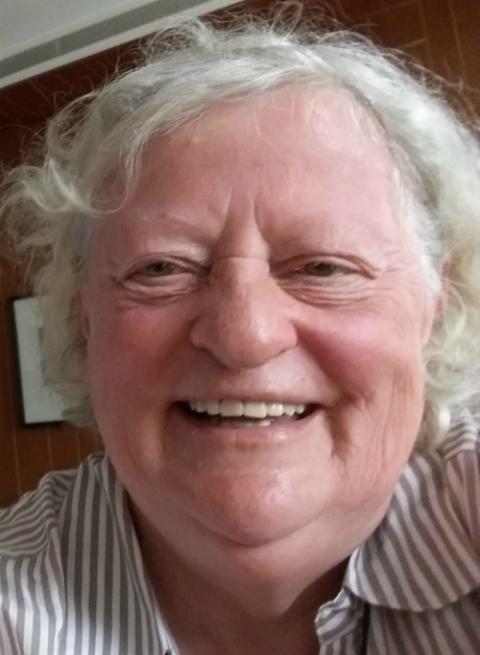
Sr. Marjoleine Bruinen, secretary general of the Union of the European Conferences of Major Superiors (Provided photo)
The president of the European organization, Fr. Zsolt Labancz, of the Order of Poor Clerics Regular of the Mother of God, reviewed the history of the group, founded in 1983. Labancz; vice president Sr. Danièle Faltz of the Sisters of Christian Doctrine of Nancy; Sr. Katharina Kluitmann, president of the German Conference of Religious; and Sr. Marjoleine Bruinen, secretary general of the European conference and a Dominican Sister of Bethany, offered reflections and conclusions about future issues arrived at during the last general assembly, held March 13 in Germany just as the COVID-19 virus was spreading through Europe.
Thankfully, no representative from the 17 countries attending contracted the virus. Labancz said the focus of the meeting was on synodality — "walking together as religious" — which he described as the only way forward for religious women and men, as "we must answer the questions of present and future together."
It was interesting to learn that the meeting included Lutheran sisters from Germany, something quite unique because I am not aware that the U.S. Leadership Conference of Women Religious has had religious from other denominations as participants.
Labancz also noted that one of the speakers of the assembly spoke about religious as an irreplaceable prophetic body in the church, affirmed later by Faltz. During the meeting, the large group broke into smaller conversational groups without set agendas. This surfaced a number of issues and concerns that religious life will face into the future.
Some of these were echoed in the LCWR webinar. Common themes from the two webinars included:
- Emerging awareness of ourselves as a global/intercultural sisterhood;
- Aging congregations;
- Congregations coming to conclusion;
- The need to move out of competitiveness to mutuality among congregations;
- Increased travel restrictions that will necessitate new communication systems, forcing us to become even better at using current and future technologies;
- Economic issues of congregations due to aging and illness and decrease in investment income and accepting our vulnerabilities, which will thrust us into deeper solidarity with others in the world.
Embracing our vulnerabilities will deepen our need for contemplative prayer/spirituality and discernment to both meet emerging challenges and help articulate meaning in the midst of loss, trauma and uncertainty.
Advertisement
The European organization had issues stemming from its unique context: integrating members from multiple conferences and countries of both women and men, all with diverse languages and cultures and extending beyond the European Union from Portugal to Russia.
Some newer national conferences, particularly from Eastern Europe, are emerging or reemerging from a 30-year window of freedom as their countries reestablish themselves after communism. Their memberships are from both former and newly founded congregations.
The newer ones tend to be younger women. The new groups usually have few members and do not have large institutions as the sisters in Western Europe, nor do they have adequate financial sustainability, a situation they share with sisters from the West. It was noted that these factors will impact how the Union of the European Conferences of Major Superiors will function into the future.
Faltz reflected that a significant impact of COVID-19 has been the loss and grief of so many sisters to the virus. She spoke passionately about the irreplaceable position of religious in Europe in the future. Besides having built many of the social structures of the countries and the church, they continue to provide both prophetic voice and action.
She said religious can take risky first steps that bishops or priests cannot do as easily. She spoke of how religious are engaging in interreligious dialogue with the variety of religions present in European countries. Being a witness of dialogue and collaboration for the many diverse nations is a very important prophetic role.
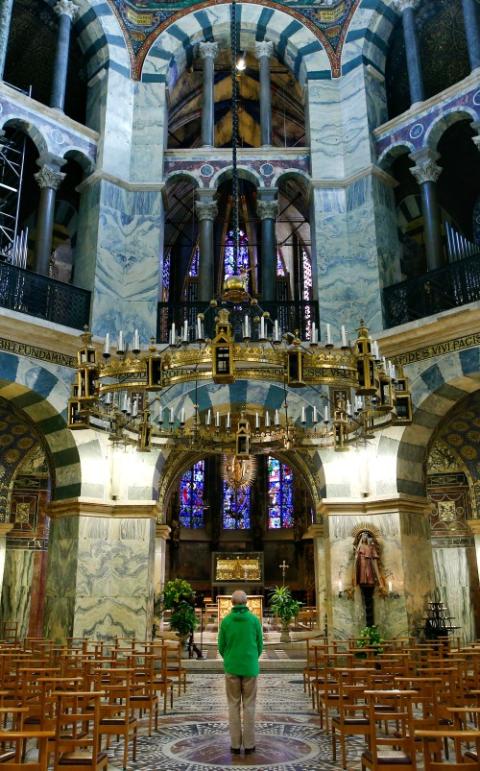
A man prays inside the cathedral in Aachen, Germany, March 25, amid the coronavirus pandemic. (CNS/Reuters/Thilo Schmuelgen)
She raised the question in her presentation about the future of the Catholic Church in Europe. She noted that women still have little or no voice, people have been leaving the church and with the current situation of Mass online, she wondered, "Who will return?" The COVID-19 lockdown brought the full force of clericalism to the surface as priests were the only ones who could participate in the eucharistic ritual in real time, as the rest of the people of God fasted, watching them celebrate.
Bruinen's almost daily challenge as the secretary general is to connect with the many conferences of Europe, encourage them to join together in counteracting anti-trafficking in Europe and to make the Union of the European Conferences of Major Superiors better known. Her role to be a unifying agent makes the diversity of languages and the need for translators especially challenging. She also is responsible for preparing webinars on subjects requested by the various conferences.
The LCWR speakers' presentations offered broad swaths of thought for consideration. President Sr. Jayne Helmlinger, a Sister of St. Joseph of Orange, spoke about COVID-19 as bringing disquiet, raising questions about what will emerge, what shifts of life or ministry will occur.
She cited the 1918 influenza epidemic that pushed sisters into health care ministries and wondered, "What will our shifts be?" What are the global energies emerging — perhaps unity in suffering? Helmlinger noted, similar to Labancz, that questions will no longer be answered by individual groups, but only in collective conversation.
Emerging LCWR orientations seem prophetic to U.S. sisters now: global sisterhood, porous boundaries inside and outside religious life, integrative partnerships within and outside the U.S., a mission focused in the public square where our voice is needed, and becoming technologically astute to be able to communicate with one another and our youth.
Holy Cross Sr. Sharlet Wagner noted that religious life will face serious economic impact from COVID-19 and increased handing over of institutional ministries to the laity. Sisters may be led even more into advocacy for justice and bringing attention to the inequities that have become so apparent in U.S. society but also in our congregations. Our use of technologies will be challenged as travel will be limited by closed borders and visa restrictions, and digital communications will be used more than ever.
Adrian Dominican Sr. Elise García, president-elect, noted the importance of developing eco-spiritualities that include the entire universe. Being challenged to be without the Eucharist pushes us to find communion in other ways, she said, and to live comfortably with feelings of helplessness. Our current cloistered life challenges us to find new ways of being present, holding the universe's pain and suffering, healing and prayer.
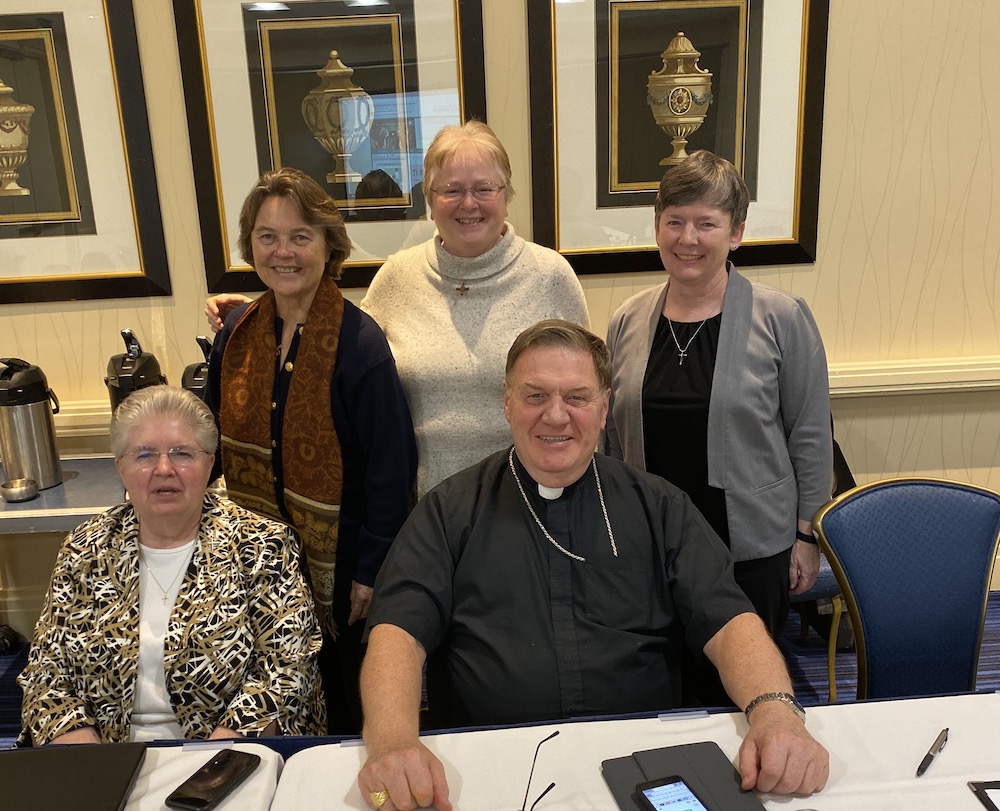
Pictured at a meeting of the Commission on Religious Life and Ministry Nov. 8, 2019, in Baltimore with leaders of the Leadership Conference of Women Religious, from left: St. Joseph of Philadelphia Sr. Carol Zinn, executive director ; Adrian Dominican Sr. Elise Garcia, president-elect; St. Joseph of Orange Sr. Jayne Helmlinger, current president; Cardinal Joseph Tobin, chair of the commission; and Holy Cross Sr. Sharlet Wagner, past-president. (Courtesy of LCWR)
LCWR Executive Director Sr. Carol Zinn, a Sister of St. Joseph of Philadelphia, articulated four major shifts that she thinks will transform religious life. U.S. sisters are deeply affected by a culture of autonomy, competitiveness, ownership and invincibility. COVID-19 is shattering this culture as we are being thrust into solidarity, which is new to us. We need help from our sisters around the world to learn this together; competitiveness among congregations will need to be left behind and a newer challenge to even move beyond collaboration to mutual partnerships. We can do nothing alone.
We have been infected by a pride of ownership, thinking our charisms and missions belong to us. COVID-19 can move us into recognizing that they are trans-charisms and missions, and even more, transcultural — belonging to the entire world.
Invincibility has also infected us. We are not the "essential workers" that we may have considered ourselves to be. We have stayed at home to work, watching the real essential workers going out every day into a precarious world to serve the rest of us. Are we willing to be vulnerable like they are and if so, how will this look?
She went on to remind us that our congregations were founded in chaos and disruptive periods of history. Living with uncertainty is in our DNA. We are only a blip in that long history and as we realize this, we will recognize that our "shifting" is for the long haul. How will we be witness to this?
LCWR can help by calling us all to "be" communal among our congregations and with others in contemplative dialogue, anticipatory leadership and in meaning making. How do we do these together? Both groups ended with a call to all of us religious to remember that Jesus is the center of our lives: "Do not let your hearts be troubled. Trust in me."
[Joyce Meyer is a member of the Sisters of the Presentation of the Blessed Virgin Mary and is GSR's liaison to women religious outside of the United States.]







